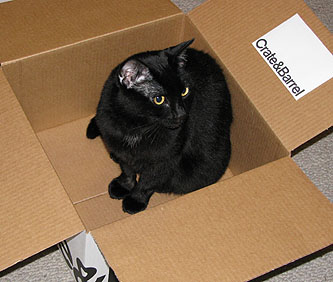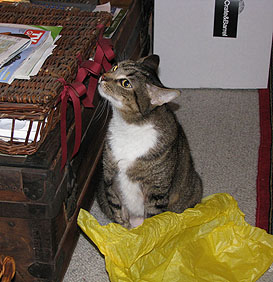FRIDAY CATBLOGGING….Last week I promised guest catblogging, and guest catblogging we shall have! This week’s episode comes via my sister, who’s doing some long-term catsitting for a friend and now has two new companions. That’s Azrael on the left, examining that perennial cat favorite, a cardboard box, and Jasper on the right. Azrael is a cute little lap cat who (apparently) demands attention at all times and all places. Jasper is more the economy size, and my sister complains that he keeps her up at night by sleeping next to her and purring loudly. This sounds absurd to me, since purring is a well known tranquillizer, but there you have it. Welcome to catblogging, A&J. The usual suspects will return next week.



















